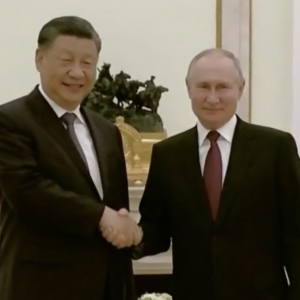The following is the latest weekly update on the Russian invasion of Ukraine, written by John Hardie, deputy director of the Russia Program at the Foundation for Defense of Democracies.
Putin Hosts Xi for State Visit
Days after the International Criminal Court issued a warrant for his arrest, Vladimir Putin hosted Chinese leader Xi Jinping for a state visit. The event marked a diplomatic victory for Putin, who is eager to counter Western efforts to isolate Russia — even if it means accepting greater dependence on China. On the eve of the trip, the two autocrats published articles lauding Russian-Chinese ties and decrying alleged U.S. efforts to bully their two countries.
The next day, Xi met with Russia’s prime minister and then again with Putin for formal talks, this time joined by other Chinese and Russian officials. The two sides released joint statements pledging to deepen their strategic partnership and economic cooperation. They also signed 10 agreements, mainly covering economic issues.
Putin said Moscow and Beijing are close to a deal for the Power of Siberia-2 pipeline, which would carry more Russian gas to China, although Xi gave no indication a deal is imminent. The deal will likely benefit Beijing with highly favorable terms, exploiting Moscow’s growing reliance on exports to China.
While important symbolically, the visit appeared thin on substance. One Russian expert on Sino-Russian relations noted the “real substance of (the) talks and deals reached might be the underwater part of the iceberg.” A key question is whether Putin secured a Chinese commitment to send lethal military aid, particularly artillery ammunition, to support Russia’s military in Ukraine.
The Russian defense minister and the head of Russia’s Federal Service for Military-Technical Cooperation participated in the talks, indicating military and defense-industrial issues were discussed. But the two sides didn’t publicly address the aid issue.
The war itself received little apparent attention. Putin did make a point to welcome China’s recent peace plan, which is broadly friendly to Moscow’s position. Both parties know the proposal has zero chance of success. Instead, the plan allows Beijing to present itself as a responsible global actor, currying favor among non-Western audiences while deflecting Western pressure over China’s support for Russia.
Putin Visits Mariupol, Zelensky Answers at Bakhmut
Putin made a surprise visit to the occupied city of Mariupol. Russian forces captured Mariupol last May after months of fierce resistance making the city a symbol of Ukrainian defiance. During Putin’s trip, Moscow’s propaganda touted Russian efforts to rebuild the city. But in a Kremlin-released video, a woman can be heard shouting, “It’s not real! It’s all for show!” The Russians later edited her voice out.
The visit is striking, given that the Kremlin is typically paranoid about protecting Putin’s health and safety. While the munitions provided for Kyiv’s Western-donated rocket artillery systems can’t reach the city, Ukraine has other weapons that can, and Ukrainian special forces and partisans have conducted attacks in Mariupol and other occupied areas. Moscow apparently kept information about Putin’s visit close to the chest to deny Ukraine the opportunity to prepare a strike.
While the United States regularly provides Ukraine with military intelligence, Washington reportedly withholds information that could facilitate strikes against Russia’s senior leaders.
President Volodymyr Zelensky answered on Tuesday by visiting military positions near the besieged eastern Ukrainian city of Bakhmut, per a statement he released on Telegram. In recent weeks, Ukraine has deployed reinforcements and launched counterattacks to fend off Russian efforts to encircle the besieged city. Russian advances around Bakhmut have slowed, although Ukrainian forces remain at risk of encirclement.
Biden Sends More Arms to Ukraine — But Not Cluster Munitions
The Biden administration on Monday unveiled another military aid package for Ukraine worth up to $350 million. The package includes various types of ammunition and materiel, including unspecified mine-clearing equipment necessary for the planned Ukrainian spring offensive.
The White House, however, remains unwilling to provide some notable items on Ukraine’s wish list. On Tuesday, the top Republicans on the House and Senate armed services and foreign affairs committees sent a letter urging President Biden to “immediately provide” Ukraine with artillery cluster munitions known as Dual Purpose Improved Conventional Munitions.
Like the United States, neither Ukraine nor Russia is a party to an international convention that bans the possession or use of cluster munitions. Both sides have used them in their current war. Kyiv has been asking the Biden administration for cluster munitions since last year, to no avail.
Foreign Policy recently reported that Turkey had sent Ukraine U.S.-designed DPICMs last year, although Ukraine’s ambassador to Turkey denied it. As the lawmakers note, sending cluster munitions would help Ukraine target Russian infantry and armor while alleviating Kyiv’s shortage of artillery ammunition. That shortage undermines Ukraine’s ability to repulse Russian attackers and could hamper its expected coming counteroffensive.




